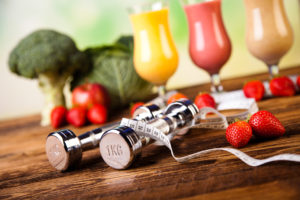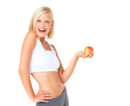Should You Take Vitamin and Mineral Supplements to Support Your Exercise?

If you eat a wide range of fresh fruits and vegetables, whole grains, lean protein, seafood and low-fat dairy, then most likely you’re getting the nutrition you need to support your exercise regimen. And overall that is the preferred way to get necessary vitamins, minerals and nutrients, since the ones from food tend to work together better than taking them as supplements.
However, the fly in the ointment is that most of us overestimate the actual amount of nutrition we’re getting. We could be getting far less than we think and thus may not be getting the proper nutrition at all. Some supplements help with exercise and provide a safety net for the days when we don’t eat right.
Free Report: 15 Foods To Eat Before & After Your Workouts4 Common Nutritional Deficiencies
Vitamin B Complex (B12 in particular)
These supplements help with exercise because they boost energy levels and you need to get enough Vitamin B to support your workout routine. Excessive alcohol use, some medications and being over 50 can all result in a deficiency. Why over 50? Because as we age, we don’t absorb vitamins and minerals as well as we did when younger. Even if taking a multivitamin, be sure to ask your doctor if it contains enough to keep you from being deficient.
Calcium
Most doctors recommend supplementation to keep bones strong – something you need if on a rigorous exercise program. Keep in mind that alcohol, caramel-colored soda, certain meats and coffee all work to deplete our calcium stores.
Vitamin D
This is a common deficiency in many people today. And even most multivitamins don’t contain near what we need to stave off cancer, depression and heart disease. A bad cardiovascular system can’t get the necessary oxygen and nutrients to the cells to make energy. Consequently, you won’t have the necessary energy to carry you through a workout.
If in a sunny area of the world, 15 to 20 minutes of exposure per day is all you need to get enough as our bodies make it from sunlight. If you’re questioning if you are deficient or not, have your doctor run a test and recommend an amount you need.
Iron
Depending on your exercise level, gender, age, and if you’re vegan or vegetarian, you may be anemic or on the verge of it if you don’t eat meat or enough of it. If you’re feeling run-down and struggle to get through a workout, have your doctor run a serum ferritin test to check your iron levels. This is one mineral that you don’t want to guess as far as how much you take as too much can be as bad as too little. After running the test, your doctor can prescribe the right amount and from what source.
15 Foods To Eat Before & After Your Workouts
If you’re fatigued after an exercise program, the reason may be that you’re not getting enough vitamins, minerals and nutrients to support your level of exercising. See your doctor for a check-up and ask about deficiency, and if so, he or she can explain and recommend how supplements help with exercise to bring your level up to par.
Your body needs a certain kind of nutrition in each stage of an exercise workout. People are often amazed at how small dietary changes can reap huge results with their fitness goals. Whether you want to build muscle or improve your cardio performance, this free report, 15 Foods To Eat Before & After Your Workout provides details on the foods you should eat to help you achieve better nutrition and a new personal best.

